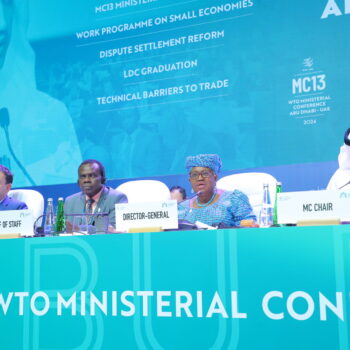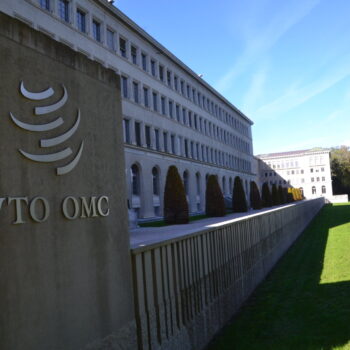An E3G-Chatham House report, Innovation and Technology Transfer: Framework for a Global Climate Deal, released today, is calling for urgent global investment in low carbon and adaptation innovation to be a central component of a new Global Climate Deal.
This increase in global R&D investment, roughly equivalent to that of the space race era, needs to be delivered within the next decade to achieve climate security.
Stabilising global temperature increases below 2°C will require global emissions to peak and reduce in the next 10-15 years. The E3G-Chatham House analysis shows that current approaches to low carbon innovation and deployment are not adequate to meet the climate change challenge.
Lead author, Shane Tomlinson of E3G, explains:
"Climate change presents the world with a unique challenge. The Earth’s capacity to absorb and adapt to temperature increases and climatic changes puts a very real time limit on when low carbon and adaptation technologies need to be delivered.
To avoid locking our economies into high carbon growth we need to transform global cooperation to simultaneously develop and deploy new technologies in rich and poor countries within this timeframe. This will require a very rapid shift towards new innovations such as low carbon energy sources and drought resistant crops".
Taking into account the need to hedge against potential policy and technology failures, and the risk of extreme climate scenarios, the report argues for a portfolio approach to accelerate the development and demonstration of critical technologies. This will require an increase of $15-20 billion per annum over the next 10-15 years in global research, development and demonstration support above current levels.
Tomlinson continues:
"We are calling for a ‘space race’ level of ambition and investment in R&D for low carbon and adaptation innovations.
While this is undoubtedly a major global challenge the sums required are not unprecedented. The USA alone invested close to $20billion per annum on research and development at the peak of the Apollo Programme to get mankind to the moon. E3G is calling on industrialised nations to collectively contribute a similar amount annually over the next 10-15 years to accelerate the development and demonstration of technologies critical to achieving climate security".
Negotiators in Poznań need to set a clear agenda that enables a broader and more urgent focus on innovation to:
- Strengthen the capacity of developing countries to innovate themselves in response the unique challenges they will face;
- Create mechanisms to properly discuss and further Intellectual Property Rights debates on low carbon technology development and sharing;
- Agree what role the UNFCCC or other international bodies will play to enable faster technology development and deployment and what funding mechanisms can be used to encourage these developments.
We need a Technology Development Objective at the heart of the Copenhagen Deal to ensure we deliver the right scale and speed of action,” Tomlinson said.
The report also highlights the need for rapid deployment of innovation climate solutions in both developed and developing countries and calls for a shift in the emphasis on technology transfer discussions.
Tomlinson explained:
"The current debate has a very narrow focus in terms of the transfer of technologies from the developed to the developing world. Developing countries don’t just need technological ‘hand outs’ they need scope and support to develop their own innovative capacity to adapt existing technologies to their specific market and climatic needs, cover orphan areas of research and enable the uptake of new disruptive innovations."
The E3G-Chatham House report argues that:
- Faster and broader innovation is critical for delivering climate security while preserving energy security;
- Current innovation programmes are not adequate to manage the risk of potential policy and technology failures and higher ranges of climate sensitivity;
- Developed countries need to shift their national strategic innovation priorities if international co-operation is to be effective;
- Developing countries require support to build effective innovation systems and not just narrow technology transfer;
- Delivering innovation faster and to scale requires the creation of strong new markets for innovative low carbon products and a diversity of cooperation initiatives;
- A failure to constructively tackle IPR and competitiveness issues will limit the pace of innovation and diffusion and potentially poison the international climate negotiations.
Ends
Editor’s Notes:
1. E3G is an independent, non-profit European organisation operating in the public interest to accelerate the global transition to sustainable development. E3G builds cross-sectoral coalitions to achieve carefully defined outcomes, chosen for their capacity to leverage change. E3G works closely with like-minded partners in government, politics, business, civil society, science, the media, public interest foundations and elsewhere. More information is available at http://www.e3g.org
2. Chatham House, Chatham House has been the home of the Royal Institute of International Affairs for over eight decades. Our mission is to be a world-leading source of independent analysis, informed debate and influential ideas on how to build a prosperous and secure world for all. http://www.chathamhouse.org.uk
3. Innovation and Technology Transfer is a new report from E3G, in conjunction with Chatham House, as part of their programme of work on Climate Change and Energy. The Executive Summary and full report can be downloaded as a pdf from the E3G website:http://www.e3g.org


